Amb. John Bolton – Tensions with North Korea and Russia-Ukraine war still grinding on
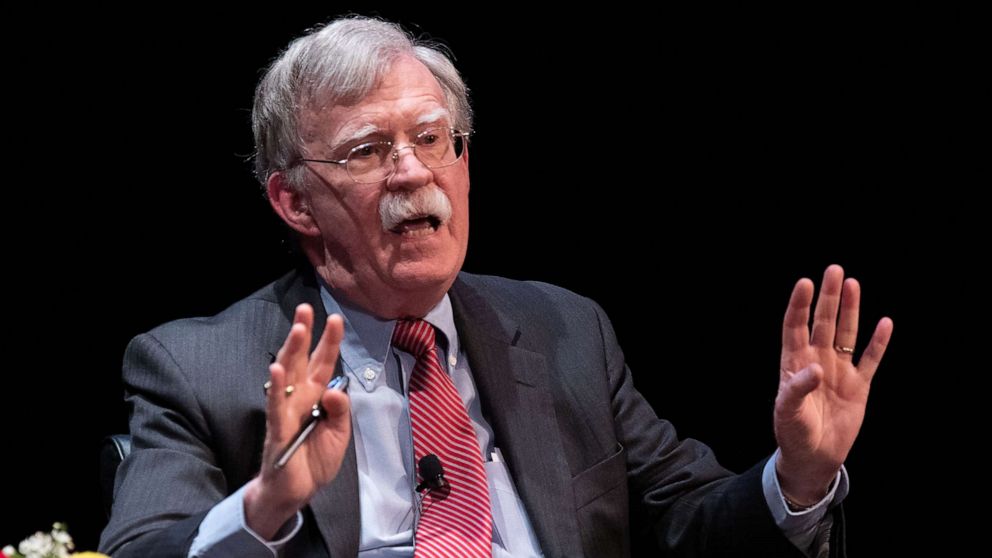

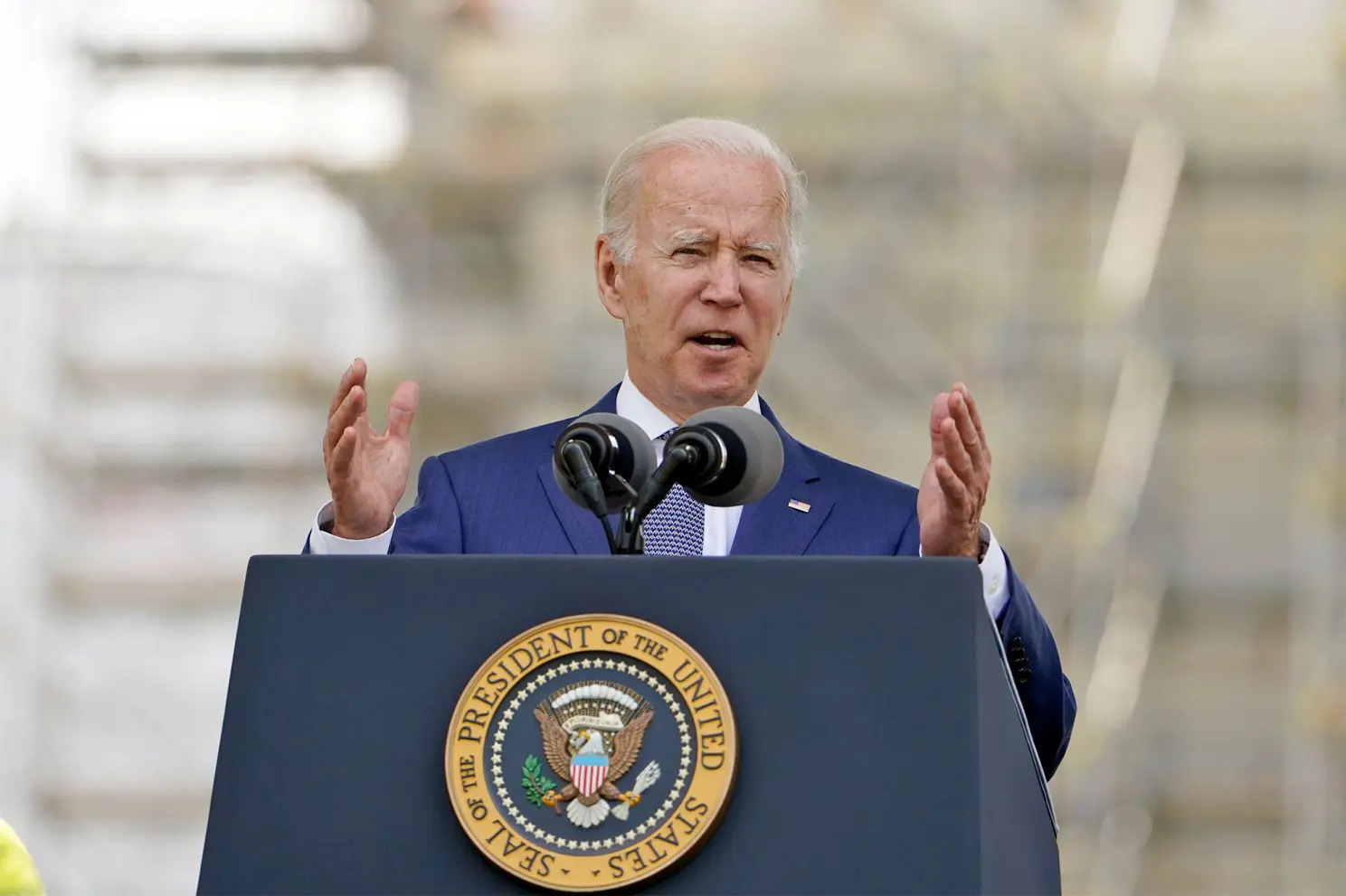
This article appeared in The New York Post on May 5th 2022. Click here to view the original article.
President Joe Biden’s responses to Russia’s attack on Ukraine comprise a series of failures.
First, he failed to deter the invasion itself, the devastating consequences of which are unfolding daily. Second, US intelligence grossly overestimated Russia’s military competence, briefing Congress that Kyiv would fall in days and the whole country in weeks.
Third, US and allied assistance has repeatedly been behind the curve, with Ukraine saved primarily by its own soldiers’ grit and Russian military ineptitude.
Congress is nearing approval of $40 billion in new aid. Many now talk not merely of “saving” Ukraine but of “victory.” Of course, it would be helpful to know what we mean by that.
Without defining our objectives (and Ukraine’s) more precisely, we will remain in today’s semi-coherent muddle, even as we enter what Ukraine’s defense minister calls a “new, long phase of the war.”
Moscow’s unprovoked aggression launched a war primarily about territory. President Vladimir Putin and many Russians believe Ukraine and other Soviet territories were illegitimately sundered from the rodina, Mother Russia, and they want them back. Ukrainians, with equal passion and far more justification, want full sovereignty and territorial integrity, as mutually agreed among all Soviet republics when the USSR dissolved on Dec. 31, 1991.
Defining “victory” is becoming more urgent. Last week, Defense Secretary Lloyd Austin asked Russian Defense Minister Sergei Shoigu to consider an immediate cease-fire, which Moscow undoubtedly saw as a sign of weakness. At a minimum, before negotiations start, we should know what we are negotiating for, which at the moment we do not.
Importantly, defining “victory,” or at least agreeing upon a common set of Ukrainian-NATO goals, is where allied unity is most likely to fracture irreparably.
Putin knows this for a certainty. The veneer of alliance unity, incessantly touted by the Biden administration and its media scriveners, already conceals enormous differences in the strategy and implementation of both economic sanctions and military assistance.
While acceptably resolving the conflict requires settling many contentious issues — Russian reparations and accountability and Russia’s post-conflict relations with the West to name a few — the major dispute is over territory and sovereignty. We can predict, as can Putin, that many of our “allies” will perform poorly during the negotiations. Ukraine’s president, Volodymyr Zelensky, himself revealed that French President Emmanuel Macron pressured him last week to cede Ukrainian territory to Russia so Putin could save face. Zelensky, quite properly, refused.
The combatants’ opening positions are clear. Russia will insist on uti possidetis (roughly, “keep what you hold”), with each side maintaining control of the territories they respectively dominate on the day hostilities stop (whether by unilateral action or mutual cease-fire).
That will be the Kremlin’s position in any short-term cease-fire — and for the long term, in effect permanently. Indeed, this reality underlines why Russia will likely keep grinding away militarily, still hoping to increase the total territory seized since February 24.
Whatever the terms of any cease-fire, Ukraine will surely insist on quickly regaining sovereignty and territorial integrity over its borders as of the USSR’s dissolution, thus requiring Russia to withdraw both from areas seized since February and those taken in 2014, including Crimea. As of now, Zelensky sees no reason to accept anything less.
The United States should endorse Ukraine’s position, which is, indeed, what we have theoretically asserted since 2014. Implementing that position, however, implies that we provide weapons and intelligence assets not simply to stop Russian advances but to retake considerably more lost ground than Ukraine has achieved to date.
Yet it is far from clear that Biden believes in victory or accepts the necessary implications. He personally decided against transferring Polish MiGs to Ukraine, fearing that doing so would be “escalatory.” Ukrainian pilots, though, no longer want MiGs but American F-15s and F-16s and appropriate training. Is Biden prepared for that?
What happens in future negotiations is unknowable, but it would be a significant blow to American credibility globally to come as close as Ukraine has to defeating a superpower only to give away at the negotiating table what has been won at such a high cost on the battlefield. We do not have forever to make up our minds.
John Bolton was national security adviser to President Donald Trump, 2018-’19, and US ambassador to the United Nations, 2005-’06.
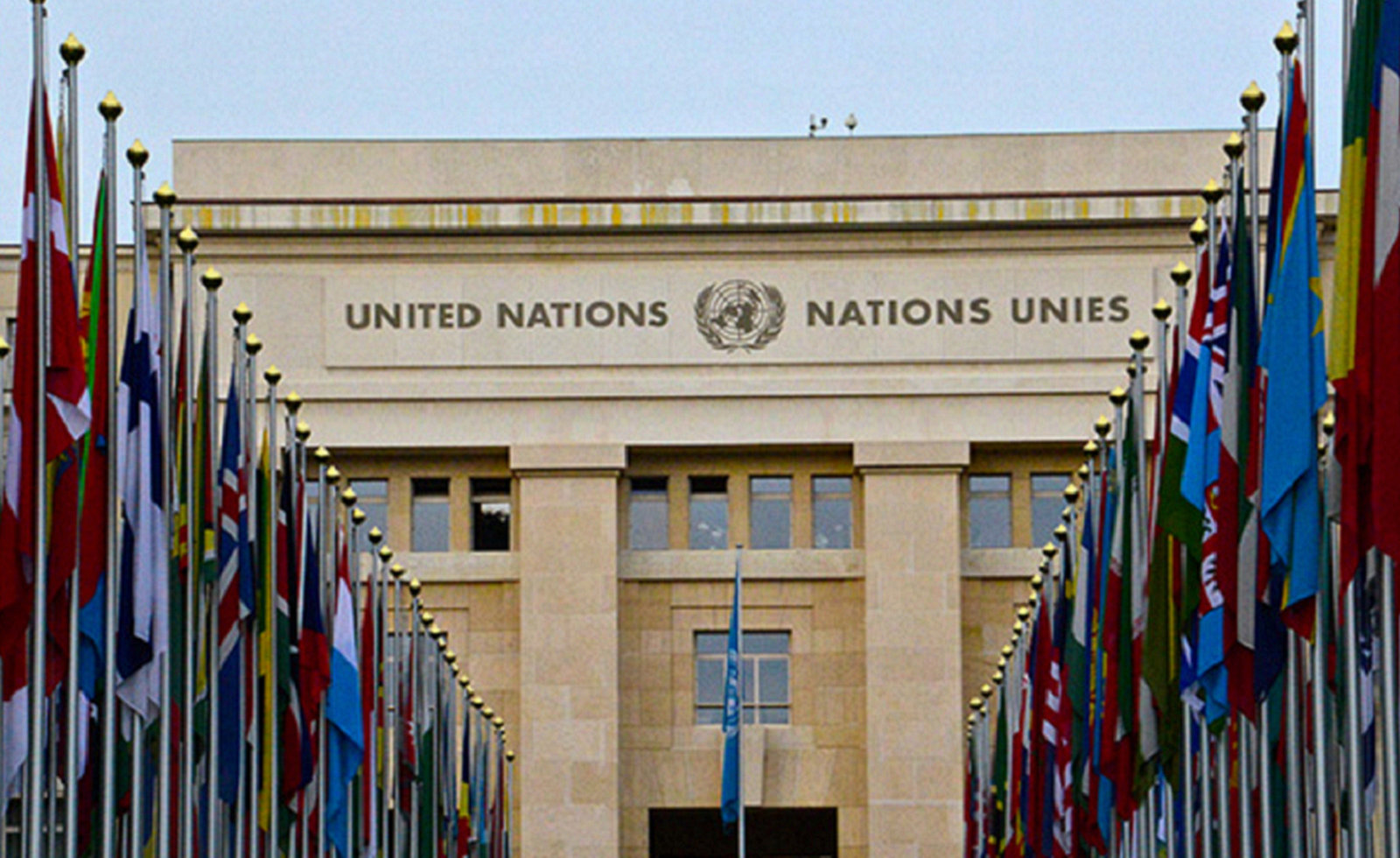
This article appeared in The Hill on April 25th 2022. Click here to view the original article.
The Biden administration is committing an unforced error at the United Nations (UN) that risks reviving the long-simmering issue of the veto power wielded by the Security Council’s five permanent members. Russia’s Feb. 25 veto of a draft resolution deploring its invasion of Ukraine prompted a renewed effort to delegitimize the “Perm Five” veto, a controversial issue since the UN’s founding in 1945.
Astonishment at Moscow’s veto and its result emerged in headlines such as: “Russia’s veto makes a mockery of the United Nations Security Council.” To which, the proper response is: mockery of the Security Council? Where have these people been the last 77 years? Have they forgotten the Council’s near-total Cold War paralysis and irrelevancy, the UN’s longest running failure?
During the Charter’s drafting, many Americans and others objected to granting Security Council vetoes to World War II’s major victors. Eleanor Roosevelt, for example, said, “a good many people think that… the veto power should be done away with in order to insure a wider expression of the majority point of view. For the time being, however, that idea has been set aside.” Not until 1970 did Washington cast its first veto.
The current effort to constrain the veto is led by Liechtenstein (yes, you read that correctly), with more than 50 co-sponsors on a measure requiring the General Assembly, within 10 days of a veto, “to hold a debate on the situation as to which the veto was cast.”
Surprisingly, the Biden administration, alone among the Perm Five, has joined this misbegotten effort, on which the Assembly will vote April 26. With due respect to the good people of Liechtenstein, their government needs better international priorities.
Unwise and unnecessary, the proposed resolution, following Mrs. Roosevelt’s logic, reflects the long-standing urge to weaken and ultimately eliminate the veto. Its proponents apparently either don’t understand or don’t care that, for the United States, an undiminished, unimpaired veto power is an absolute prerequisite to continued participation in the UN itself.
Consider carefully the Biden administration’s own dangerous arguments. Ambassador Linda Thomas-Greenfield criticized Russia for its “shameful pattern of abusing its veto privilege.”
But there never would have been a “Security Council” without the veto, which Joseph Stalin demanded and Franklin Roosevelt accepted. They would be amazed and amused (Mrs. Roosevelt notwithstanding) to hear it called a “privilege.” The Charter’s Article 27 expressly authorizes the veto, to which every original signatory and every subsequent member agreed. In the UN context, the veto is not a privilege, it is a right. Arguing that it is merely a privilege implies it can be taken away or should be relinquished. If that’s President Biden’s view, he should initiate a broad debate on the issue in Congress, which would be especially informative during this midterm election year.
Clearly, there is no acceptable excuse for Russia’s conduct in Ukraine, but “shameful” is in the beholder’s eye. As Elliott Abrams has stressed, the overwhelming majority of America’s recent vetoes have been to protect Israel.
U.S. vetoes were often alone, with France and the United Kingdom deeming America’s position inappropriate or even a little shameful. Certainly, Russia and China weren’t happy. Nonetheless. two of my happiest days as UN ambassador were when I cast Security Council vetoes against unjust anti-Israel resolutions. Limitations on the veto power will never be imposed only on countries casting “shameful” vetoes, but on all permanent members. That is flatly unacceptable to the United States.
Moreover, Liechtenstein’s resolution is utterly unnecessary to achieve the supposed “transparency” its proponents seek. Its immediate real-world impact will be trivial, hardly worth the effort being expended to obtain its passage, unless its cosponsors’ ulterior motives are part of a larger delegitimization effort. No one can say for certain how much this resolution will undermine the veto long-term, but for the U.S. to co-sponsor it suggests either blindness or Biden administration complicity with the delegitimization objective.
It’s not as though vetoes are cast in secrecy. Every veto in UN history, like all formal Council actions, has been made in open, formal Council sessions, open to print and electronic press and the public. Almost all Council members make statements explaining their votes, particularly vetoes, for anyone interested. The Charter (in Article 31) specifically provides that any UN member “may participate… in the discussion of any question brought before the Security Council whenever the latter considers that the interests of that Member are specially affected.”
I cannot recall any instance where the Council has denied a member’s request to speak. The Charter also provides (in Article 24) that the Council “shall submit annual and, when necessary, special reports to the General Assembly for its consideration.” What more is needed?
If anything, the Security Council is now so transparent that its frequently feckless actions are already in plain view. The Biden administration may stand behind Liechtenstein’s proposal, but other nations should understand that this is merely a fit of absence of mind, not a permanent change in American support for the veto power.
John Bolton was national security adviser to President Trump from 2018 to 2019, U.S. ambassador to the United Nations from 2005 to 2006 and held senior State Department posts in 2001-2005 and 1985-1989. His most recent book is “The Room Where It Happened” (2020). He is the founder of John Bolton Super PAC, a political action committee supporting candidates who believe in a strong U.S. foreign policy.
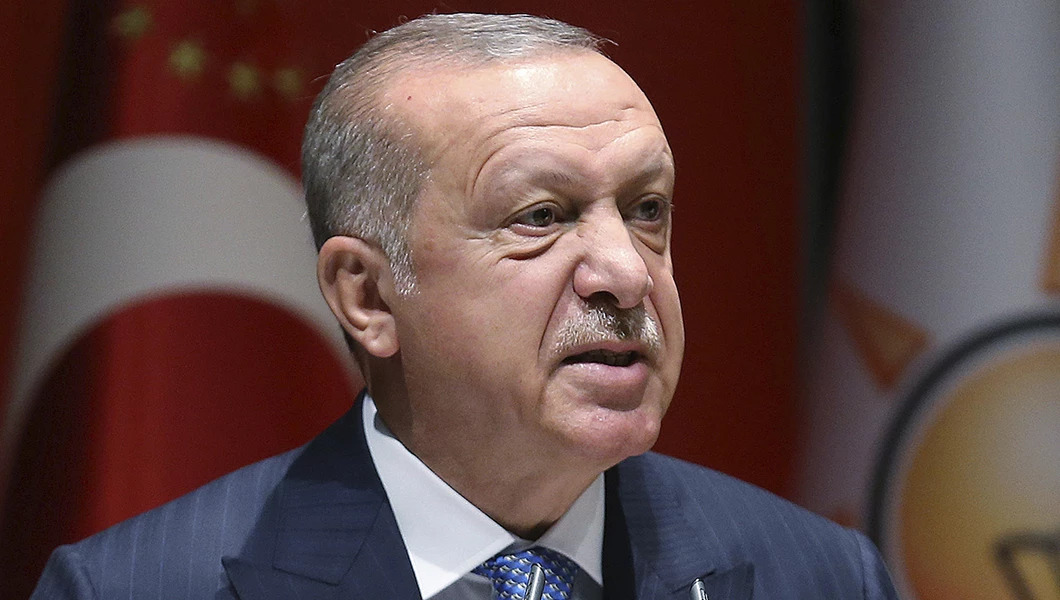
This article appeared in The Washington Examiner on April 22nd 2022. Click here to view the original article.
Turkish democracy has reached a turning point.
Recep Tayyip Erdogan’s two-decade strongman rule has reversed his country’s progress toward a liberal society. On April 6, the Turkish President secured the passing of new electoral laws that will make it more difficult for smaller parties to enter parliament, thereby inhibiting opposition coalitions and allowing him to use state resources to organize his own campaign events. These changes will make it harder for opponents to challenge Erdogan’s tightening grip on the Turkish electoral system.
As Erdogan prepares to run for re-election in the coming year, the importance of a vibrant and functioning Turkish civil society cannot be overstated. And it could not be more at risk.
These changes are the latest in a string of moves designed to dismantle what remains of Turkey’s once-promising democratic architecture. Erdogan’s authoritarianism has galvanized resistance in the form of an opposition coalition — the “Nation Alliance” led by the Republican People’s Party — while the dire state of the economic, social, and political situation in Turkey has catalyzed vibrant anti-government protests against inflation and for women’s rights and academic freedom.
The June 2023 elections will be a crucial test for pro-democracy voices in Turkey to rebuild their institutions. Their success will depend on their ability to bolster Turkey’s most at-risk hallmarks of free and fair elections: transparency, non-interference in voting, loser’s consent, and a free press.
They face an uphill battle. President Erdogan’s regime has curtailed media access, undermined an open campaign process (though bribery, intimidation, and violence), and is now seeking to further obfuscate the voting process through blatantly undemocratic reforms.
Erdogan’s campaign to degrade free media has made Turkey one of the world’s leading jailers of journalists, according to the Committee to Protect Journalists. The government now controls 90% of the country’s media through regulatory bodies like the High Council for Broadcasting; the Press Advertising Council, which allocates state advertising; and the Presidential Directorate for Communications, which issues press cards.
Under Erdogan, censorship laws have also been wielded as a weapon against online political discourse. A 2020 media law imposes requirements on social media platforms to remove content at the command of the Turkish government or else risk punitive fines. Facebook and Twitter have submitted to Turkish government censorship, closing another avenue for healthy political discourse among Turkish voters.
Outside of media and online discourse, civil rights activism in general has been targeted by Erdogan’s regime. Reporters Without Borders has said that “questioning authorities and the privileged is now almost impossible” under Erdogan. Opposition parties are also increasingly persecuted by the regime, making effective political resistance increasingly difficult. In 2021, the state Prosecutor argued that the pro-Kurdish HDP party was working toward breaking the “unity of the state.” The Constitutional Court forced the closure of the party and banned 451 elected officials. These most recent reforms take further aim at the opposition, legalizing the use of state resources when the President is campaigning for himself while other ministers will be barred from doing the same.
In prior elections, Erodgan’s government has conducted systematic campaigns of intimidation. In Ankara, a local election was marred by claims of vote-rigging. Kurdish communities in particular face acts of intimidation and voter suppression. The government militarizes voting centers in the Kurdish region, claiming the security forces must “protect” against the threat of attacks by Kurdish terrorists. The People’s Democratic Party reported that political activities were banned from organizing in the streets. Under threat of intimidation by the state, Kurds are stripped of their right to vote freely.
In 2019, in what may prove a premonition of the 2023 elections, Erdogan showed that he is willing to directly interfere with democratic processes to try to cling to power.
He commanded that the Higher Electoral Commission rerun the Istanbul mayoral election after his party lost in spite of systematic irregularities that had actually worked in its favor. Despite his best efforts to intervene, his party also lost the re-run. The subsequent blowback shows it is not a foregone conclusion that Erdogan can get away with electoral interference in 2023.
The global pandemic and war in Ukraine have precipitated economic volatility and internal political turmoil. However, the free world cannot lose sight of the importance of Turkey’s upcoming elections, which will be watched by many of the world’s autocrats in waiting, keen to find out what they can get away with. Erdogan has systematically undermined every one of Turkey’s major democratic institutions to create a deeply skewed playing field. Holding his regime to account requires coordinated action from the international community, illumination of his thuggish tactics to suppress political minorities, and real consequences should he fail to make meaningful progress to restore civil discourse within Turkey.
Progress here means releasing imprisoned journalists to restore some semblance of a free press, allowing NGOs to effectively monitor the upcoming election, and cessation of hostilities against and censorship of opposing political voices. The international community should wield sanction power (as it has against Russia), turn-off foreign military sales, and level severe consequences should Erdogan fail to achieve these objectives.
John Bolton is a former UN ambassador and White House National Security Adviser. He serves as an advisor for the Turkish Democracy Project.
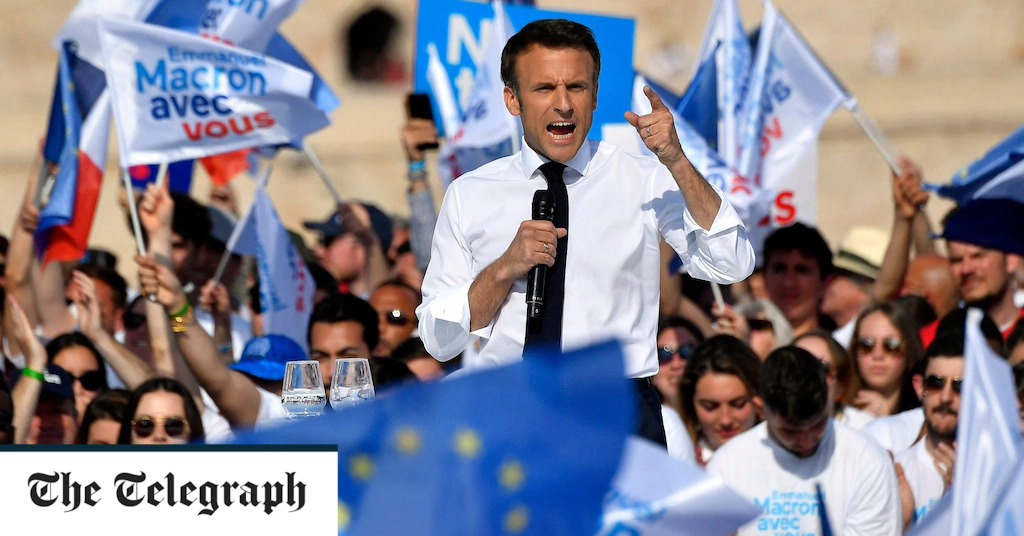
This article appeared in The Telegraph on April 18th, 2022. Click here to view the original article.
Commentary on Nato “unity” against Russia’s invasion of Ukraine has been misplaced. Nato is not unified in seeking Moscow’s defeat, and Kyiv’s memory of the execrable Minsk agreements, imposed with French and German participation, remains strong. Ukraine stays in the fight largely through its own determination and homegrown capabilities such as the missiles that sent the Moskva to the Black Sea floor.
The alliance’s performance on sanctions is scattershot, with results mixed so far and the future uncertain. Military assistance is uneven, though the UK and Eastern European responses have been outstanding. The biggest failure is Joe Biden’s uneven political leadership: weak, often late in coming, grudging and strategically incoherent. Germany, France and others are lagging.
This war is not over, and the negotiations that will ultimately ensue will be tortuous. It is no time for Nato members to pat themselves on the back. Nonetheless, now is precisely the moment for policymakers to consider the alliance’s future. We should not forget that Henry Kissinger’s classic 1965 study was called The Troubled Partnership; it still is, and will be, though for radically differing reasons.
First, the good news. Finland and Sweden seem poised to apply for membership. Public opinion in both countries has shifted dramatically in favour of joining Nato since Moscow’s aggression. These additions would strengthen Western dominance in the Baltic Sea, further isolate Russia’s Kaliningrad exclave, and eliminate an ambiguous grey zone between Nato’s eastern and Russia’s western borders. Other “neutrals” might now also step up. Here’s looking at you, Ireland.
On the negative side are Turkey and France. Turkey’s President Erdoğan is now the least-allied of Nato allies. Notwithstanding Kyiv’s effective use of Turkish-supplied drones, Ankara’s acquisition of Russian S-400 air-defence systems risked compromising the critical F-35 program, thereby endangering other Nato allies.
If Turkey’s 2023 elections are free and fair, Erdoğan’s defeat, which is entirely possible, would significantly repair the damage he has done. If he wins, his neo-Ottoman Middle East ambitions (and other troublesome behaviour) will remain threatening.
France, facing a potentially close presidential run-off, is problematic, especially given Emmanuel Macron’s persistent efforts to enhance the European Union’s military capabilities in ways that undercut Nato. Marine Le Pen has gone further, calling explicitly for a second French withdrawal from Nato’s integrated military command. None of this is constructive.
Most important is the German question. Chancellor Olaf Scholz’s pledge to invest €100 billion in defence, including purchasing 35 nuclear-capable F-35s, is helpful. Nonetheless, much more is needed to upgrade Germany’s pitifully inadequate military capabilities, and to ensure Scholz’s dramatic commitment is sustained over time. Will Germany revert to its Cold War resolve to maintain adequate national defences, or will it relapse into pretending it is too dangerous to be trusted with guns?
Central to Nato’s future is the appropriate division of labour with the EU. For Macron and others, increased EU political integration is the highest goal, leading them to advocate increased EU military capabilities and related programs that impinge on Nato responsibilities. For example, the EU made its first ever budgetary expenditure for military assistance to Ukraine, even as Nato was making precisely the same allocation decisions. This was no coincidence.
Do these integration-obsessed leaders believe the EU has no other problems worthy of their attention? Is this why they focus on expanding EU mission creep into Nato territory? For America, such efforts are daggers pointed at Nato’s heart. If anyone truly believes the EU treaty’s mutual defence clause is equivalent to Nato’s Article 5 – good luck to them. Let’s remember, the EU has only one nuclear-weapons state, whereas Nato has three. Insistence that Europe be responsible for its defence risks undercutting American support for Nato, leaving Europe protected primarily by politicians’ rhetoric.
Better leadership in Washington, new alliance members, renewed German (and even, post-election, Turkish) Nato commitments, and a substantially enhanced British role, exemplified by its current performance, would all be major pluses. Moreover, the growing threat from China should brace every Nato country for global threats to their security. History still has plenty in store for Nato if it can vindicate itself by performing successfully in today’s Ukraine crisis.
John Bolton is a former US national security adviser
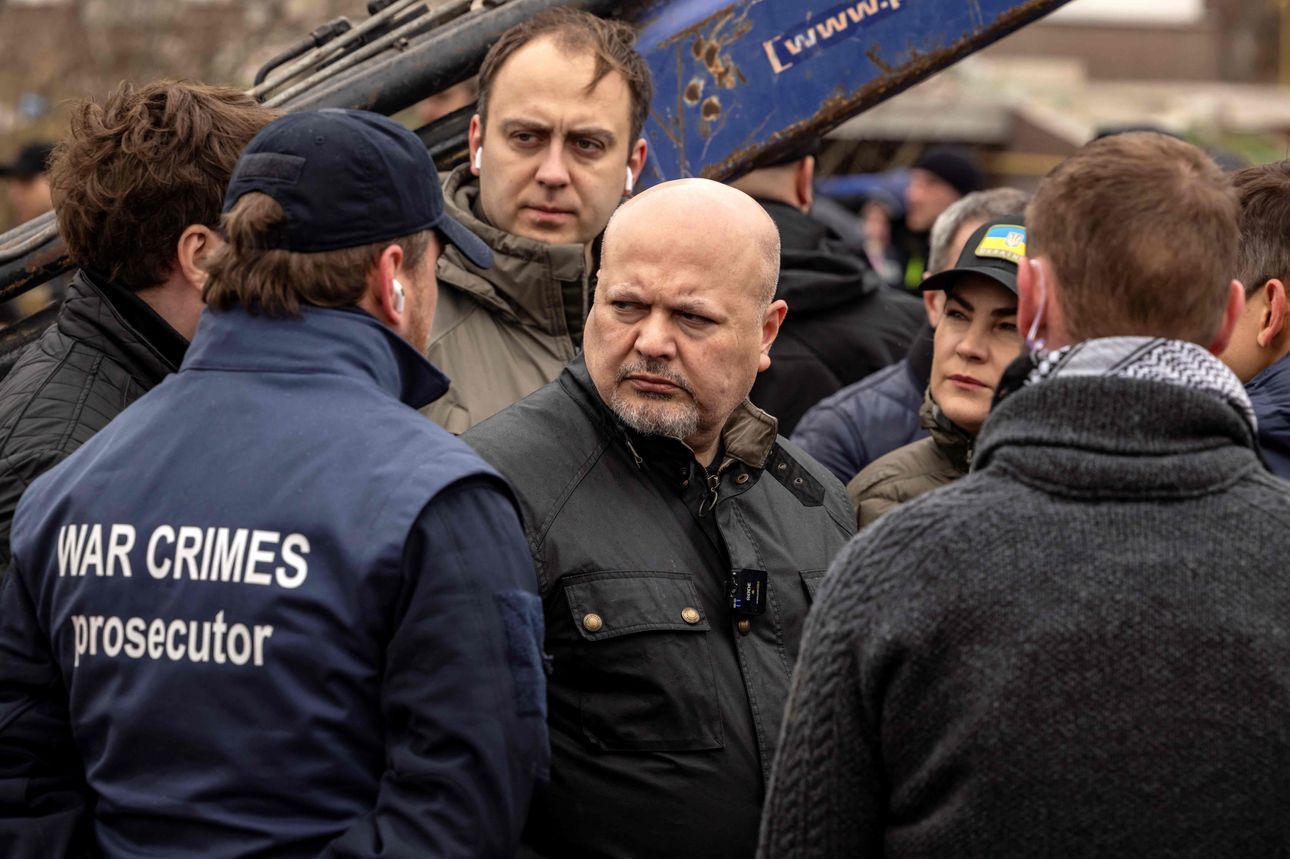
This article appeared in The Wall Street Journal on April 14th 2022. Click here to view the original article.
Harrowing images of slain Ukrainian civilians add to the evidence of Russian war crimes. While many Europeans favor hauling the perpetrators into the International Criminal Court, Washington has largely ignored the ICC since removing its signature from its foundational Rome Statute in 2002.
That may be changing. The Biden administration has made noises about cooperating with the ICC, and on March 3 a bipartisan group of senators introduced a resolution that “encourages member states to petition the ICC and the ICJ [International Court of Justice] to authorize any and all pending investigations into war crimes and crimes against humanity” committed by Russia.
Many Americans seem unaware that aiding the ICC has significant implications. The ICC is a fundamentally illegitimate assertion of power, thoroughly lawless in purportedly exercising jurisdiction over countries (and their individual citizens) not parties to the statute. The court and its prosecutor, who decides what cases to launch, aren’t part of any coherent governance structure and are under no restraining constitutional checks and balances or democratic controls. These and many other defects are unfixable, as I told Congress in 1998. ICC proponents say its 123 state parties govern the court, but this is laughable. The ICC governs itself. The prosecutor is selected by the court, which may not trouble Europeans but contravenes America’s separation of executive and judicial powers to protect liberty. It lacks jury trials, traditionally important to Americans.
The ICC’s existence, therefore, is potentially threatening. Fortunately, its record is negligible, largely because its pretensions to authority mirror those of the equally impotent ICJ. That neither has yet become dangerous to America’s democratic, constitutional sovereignty is cause for relief, not complacency.
European Union members seem fine with surrendering their sovereign powers to supranational bodies and appear ever ready to surrender ours as well. What they and others do is their business, but it shouldn’t be ours. The imperative some Americans now feel to “do something” risks putting the U.S. in the hypocritical position of invoking the ICC when it suits us, but not otherwise. We should continue ignoring the ICC because of its fundamental flaws from America’s perspective, and instead support sounder alternatives.
Ukraine provides an excellent test case. The crimes were committed there; the overwhelming mass of evidence is there; and Ukraine remains a viable state whose prosecutors have already begun their work. ICC supporters, for their own ideological reasons, say Ukrainian courts are biased and unable to administer evenhanded justice. Even some Ukrainians favor washing their hands of this burden. Nations don’t mature politically, however, by ducking responsibility, fearing they might be imperfect. Neither America nor Ukraine should succumb to these temptations. When national courts afford equal justice to all, they validate constitutional, democratic legitimacy and sovereignty. If colonial courts in 1770 could conduct fair trials of the Boston Massacre’s perpetrators, represented by John Adams no less, why should we assume today’s Ukrainian courts can’t also measure up?
ICC supporters say Ukrainian courts can render only mundane judgments, whereas Russian defendants should be charged with “war crimes” and “crimes against humanity”—offenses within the ICC’s jurisdiction. “Mundane” crimes like murder, rape, torture, arson and destruction of property are insufficiently condemnatory of Russia’s behavior, they say. This is a fundamentally political argument, revealing precisely why the ICC is in key respects a political and not a judicial body, devoid of effective constitutional or democratic control. Clear-eyed people world-wide can see and understand what Ukrainian courts will reveal. We need no schooling by Platonic Guardians in The Hague.
Even better would be a new Russia conducting criminal prosecutions. Vladimir Putin’s rule won’t last forever. How countries handle war crimes and human-rights abuses committed in their names is the truest test of, and the best way to achieve, real political maturity. Allowing a successor regime to shrug off moral responsibility for reckoning with the nation’s past is erroneous. Ceding authority to a distant international body is cowardice, not enhanced maturity.
Certainly, risk of mistake and failure is ever present, but without taking that risk, there is no easy national path back to trustworthiness and honor. Even worse, shirking enables future autocrats to assert that Russia was sold out by traitors and foreigners. Read “Mein Kampf” for the road map.
Especially if very few defendants come into Ukrainian custody, a new Russian government would have considerable work to do. Post-1989 regime change across the former Soviet bloc required successor authorities to confront their nations’ unsavory pasts. Some, such as former East Germany and Hungary, responded with prosecutions; others, such as Czechoslovakia, with procedures similar to the truth-and-reconciliation model South Africa followed after apartheid, or a mixture of approaches. The victors in 1945 began Germany’s de-Nazification, but elected German governments continued it.
Choosing the right judicial decision-maker isn’t an arcane jurisdictional issue, nor is it deferrable to the vague future. American leadership can significantly enhance Ukraine’s principled national sovereignty and remind Russians that their ultimate place in history is in their hands, not in a distant international court.
Mr. Bolton is author of “The Room Where It Happened: A White House Memoir.” He served as the president’s national security adviser, 2018-19, and ambassador to the United Nations, 2005-06.
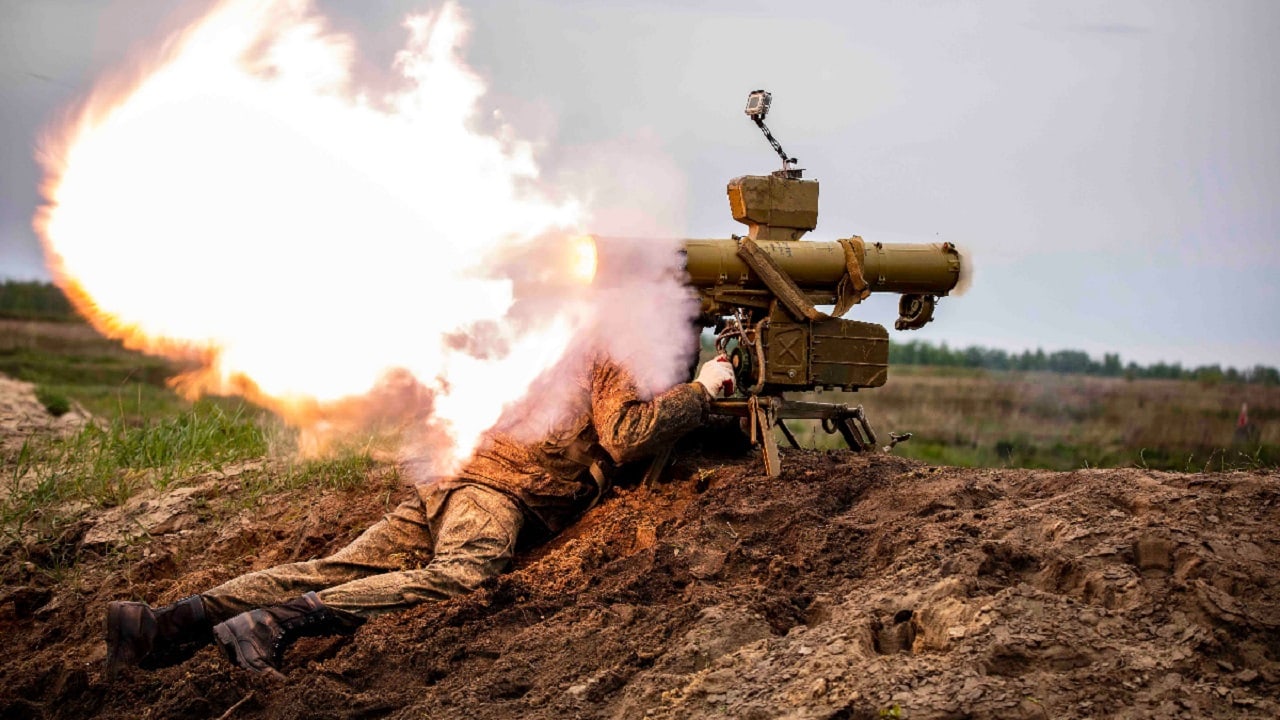
This article appeared in 19FortyFive on April 4th, 2022. Click here to view the original article.
Six weeks into Russia’s second invasion of modern Ukraine, Moscow’s stunning military failures dominate the West’s attention. Unsurprisingly, therefore, basic misperceptions are becoming conventional wisdom, thereby potentially distorting future U.S. policy, making it even less effective than at present. The following corrective effort is only illustrative, not exhaustive.
This is not Putin’s war, it’s Russia’s war. Western leaders are deluding themselves to think that Putin alone is responsible for the invasion. As Russia’s president, he obviously makes the final decisions, but he is far from alone in believing passionately that Ukraine (not to mention Belarus and other once-Soviet republics) should be returned to the rodina, Mother Russia. This is certainly true for the siloviki, the “men of power” forming the core of Putin’s advisors, from several of whom I once heard personally their message that Ukraine is a failed, illegitimate state.
Kremlin leaders have a thirty-year obsession with reabsorbing their lost empire. News reports on today’s war often read eerily and confusingly like 2014 news accounts of the Crimea annexation and Donbas invasion, reflecting the West’s historical ignorance and short attention span. The siloviki have many egregious, bloody faults, but short attention is not one of them.
No wonder America’s media and the Biden Administration are surprised by independent polls showing increasing Russian public support for Putin, even in the face of Western sanctions and Moscow’s flagging war effort. Not all Russians feel Putin’s irredentism as deeply as he. A sufficient number do, however, so that whatever else endangers Putin’s regime, public opinion is not only not a threat, it is for now a pillar of regime strength.
Putin does not have a screw loose, nor does he suffer from insufficient, inaccurate information. Not all of Putin’s advisors grovel and snivel, fearing from telling him the truth. Contrary analysis by unnamed Biden administration sources may be elements of our information war against Russia, but they do not describe Kremlin reality. Even in autocratic regimes, there are always advisors more than happy to point out their rivals’ failures, and to provide fulsome evidence to put them in a bad light. Like America, Russia has multiple intelligence agencies that vie bureaucratically for influence and attention. Besides, Soviet embassies don’t need the SVR to communicate back to Moscow what Western media are reporting. There is no upside for every fawning Putin advisor to cover for those who can easily be blamed for evident failures.
The Pentagon offered the most absurd lyrics for the “Putin is uninformed and a little nuts” mantra, speculating that his lack of information could impede ongoing Ukrainian-Russian peace negotiations. For Moscow, these negotiations are merely a propaganda exercise, something affording a patina of reasonableness to its belligerent position. Ironically, it was President Biden who brushed this chatter aside, saying “I don’t want to put too much stock in that at this time because we don’t have that much hard evidence.”
Westerners may not understand how much Putin and company value Ukraine, but that is our problem, not his. We heard this same psychoanalysis in 2014. Angela Merkel among others reportedly believed Putin was “out of touch with reality.” Andrei Illarionov, a former close Putin advisor now in the U.S., corrected her: “People in the West think Putin is irrational or crazy. In fact, he’s very rationale according to his own logic, and very well-prepared. It is not Putin who is out of touch with reality — it is the West.” This rings true. More than once, Putin has said to me, “you have your logic, we have ours; we will see which prevails.”
Part of the problem may be Putin himself. Not his advisors. He may have dismissed hard facts contrary to his preconceptions, a common human failing. It would be an equally grievous mistake, however, for America to think Putin has not by now recovered. Moreover, Russia’s battlefield failures may result from still-endemic corruption and incompetence throughout its military. “Ghost soldiers” whose salaries, weapons, rations and supplies found their way into black markets, as lower-ranking officers submitted false reports on unit strength and readiness up the chain, have now been laid bare. Despite twenty years trying to reform and modernize Russia’s military, the Ukraine conflict demonstrates that these efforts were far from successful.
Russia’s strategic mistakes have cost it dearly, but it has not yet lost the war. Russia did not launch this invasion with only one goal. The Kremlin was likely considering several options, depending on how the war unfolded. With the benefit of 20-20 hindsight, the top-line strategic objective seems to have been capturing Kyiv, overthrowing Zelensky’s government, and replacing it with a Quisling regime under Moscow’s control. This strategic blunder cost Russia numerous opportunities elsewhere in Ukraine that might already have been achieved, in turn enabling Moscow to pursue additional priority objectives. By trying too much at once, however, Moscow’s reach substantially exceeded its grasp, and it failed broadly.
Broadly, but not fatally.
The cliché tells us generals always fight the last war. In 2014, Russia seized the Crimea almost without firing a shot. Indeed, significant portions of Ukraine’s navy defected to Russia’s side. Fighting in the Donbas region was not so successful for Russia, but neither were the military costs high nor subsequent Western sanctions effective. One can easily imagine Moscow’s leaders envisaging a similar scenario in 2022. They were obviously wrong.
Even more importantly, on and after February 24, Russia violated the fundamental military doctrine of force concentration. Instead of aiming at a small number of key targets with overwhelming forces, Moscow attacked broadly with inadequate manpower, firepower and logistics. Ukraine’s heroic resistance was totally unanticipated. The result was failure to win most key objectives: Kyiv, Kharkiv, Odessa and more. Russian arms have had relatively greater success in southern and eastern Ukraine, but even these advances are far from overwhelming.
Now, Russia is belatedly trying to get its act together, withdrawing from areas around Kyiv and other northern cities Ukraine, perhaps back into Belarus and Russia, to regroup, reinforce and resupply. Moscow will either try again in the north, or redeploy these forces to the
east and south, where reinforcements are arriving from existing deployments in Georgia, the Middle East and elsewhere. The media report Syrian soldiers returning Russia’s earlier favors to Assad’s regime by coming to Ukraine, likely without crash courses on the Geneva Conventions.
The Kremlin’s goal now will likely be maximizing its military and political control throughout southern and eastern Ukraine. Russia’s overarching goal of fully conquering Ukraine is almost certainly out of reach for now, but there are many alternative, subsidiary objectives. If Putin could accomplish significant elements of these lesser goals, he would be well-placed to persuade Russia’s public that the war was worthwhile, and to induce all-too-many Westerners to turn the page, and return to “normal” economic and political relations.
Almost certainly the critical second-tier objective is control over Ukraine’s substantially Russophile areas, effectively splitting the country in two. The Kremlin’s targets are southern Ukraine, particularly control over the Black Sea’s strategically important northern coast, and eastern Ukraine, east of the Dnieper River to the city of Dnipropetrovsk and then north to the Russian border. Broadly speaking, eight Ukrainian oblasts (in addition to Crimea) are involved: Kharkiv, Luhansk, Donetsk, Dnipropetrovsk, Zaporizhzhia, Kherson, Mykolaiv, and Odessa.
These oblasts are predominantly or substantially Russian-speaking and Russian Orthodox, as compared to areas more Ukrainian-speaking, Ukrainian Orthodox or Catholic. This, of course, is the Kremlin’s view, not an exercise in Wilsonian self-determination. Because Ukraine’s demographic distribution looks like a bad case of measles, and citizens are often ambivalent or conflicted in their religious loyalties, these characterizations are not bright lines. Russia may well fail to conquer all this territory, but the more it seizes, the stronger its bargaining position when negotiations actually turn serious.
For now, Russia’s military position in eastern Ukraine is relatively strong, and “victory” entirely possible. Along the Black Sea, however, Moscow had been blocked, and Odessa seems beyond its grasp at the moment. Nonetheless, if Moscow reconstitutes its forces, coordinates its land, sea and air efforts, and Western support for Ukraine’s military insufficient, taking Odessa is still feasible. With the east and much of the south secure, Russia could make territorial “concessions” by withdrawing from areas it still holds in the north, but which are no longer tenable long-term. Putin is counting on flagging Western interest and unity. This would make it difficult and costly if not impossible to push Russia from what it holds near its current borders and Crimea. Uti possidetis remains a powerful form of diplomatic inertia.
Washington needs to step up its leadership, and NATO its performance. Let’s be clear: NATO is not fully united. The West must do better in tightening the economic noose around Russia and increasing and speeding its military assistance to Ukraine. Performance to date is mixed. Despite incessant hosannas about Alliance unity, the West is already fraying. The United Kingdom and the United States have led in supplying hardware and intelligence, but others, like France and Germany, have lagged, starting with Berlin’s pre-war offer of 5,000 military helmets, and continuing later by supplying former East German Strela missiles, over thirty years old, that did not work. Time and again, President Biden has responded to pressure from Congress and the Allies rather than leading himself, acting either belatedly or not at all, as in his refusal to authorize transferring the Polish MiGs.
Remember, every day the war grinds on is further evidence of NATO’s fundamental, unalterable shame: failing to deter Russia in the first place because of shredded credibility (see Georgia, 2008, Ukraine, 2014, and the 2021 Afghanistan withdrawal); grossly inadequate threats
of future punishment through selective, inadequate sanctions; and Biden’s early December unforced error, rejecting even the possibility of U.S. force, in exchange for exactly nothing.
This pattern must be reversed, and quickly. Given Russia’s mistakes so far, it would be a fool’s errand to bet it can successfully reculer pour mieux saute, but it is at least possible. We are likely therefore in a slow-motion race to see whether Moscow can get off its back before Ukraine’s military breaks under the strains (incompletely reported by Western media) it has felt. Time is on Moscow’s side, so slow or inadequate Western resupply efforts could be ruinous. The Western is not unified on sanctions.
Europe’s purchases of Russian oil and gas continue, and China, India and others are providing financial lifelines keeping Russia’s economy afloat. Looking ahead, the real efficacy of sanctions turns on rigorous enforcement and enhancement to close loopholes as Russia creates them. The best day for any sanctions’ regime is the day it is announced, dropping rapidly if the sanctioning powers are not as least as creative as their target. Historically, U.S. sanctions enforcement and enhancement has been decidedly mixed, and the Europeans are, to be polite, far from diligent. Modern history’s most effective and comprehensive sanctions were imposed on Iraq after it invaded Kuwait in 1990. Enforced by the U.S. and allied militaries, even these were not enough to oust Saddam’s invading forces.
The Alliance’s biggest test will be maintaining diplomatic unity at the inevitable moment when Moscow decides on serious negotiations. The siloviki see the West’s weakness for money not for the ideological reasons of their Communist predecessors, but with at last equal clarity. Already, France and Germany are searching for ways to end military hostilities before one side or the other scores a decisive victory, thus freezing the conflict without materially resolving it. This would certainly be the typical European approach. If, however, Russia emerges from its current military debacle with anything even remotely smacking of victory, the reverberations in Europe and worldwide, especially in Beijing, will be enormous. Nattering on about NATO unity may warm hearts in elite Washington circles, but all that talk is worth what you pay for it. American leadership and NATO performance to date have been inadequate. Face up to it.
The clear lesson is that Americans should not bliss out prematurely. This is a European conflict. Think Thirty Years War or Hundred Years War. Putin is
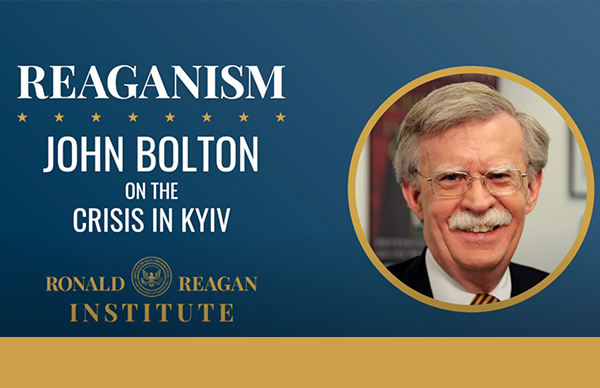
On this episode of Reaganism, recorded at our Reagan Institute Strategy meeting on February 24, John Bolton, former National Security Advisor and Ambassador to the United Nations discusses Russia’s military assault on Ukraine, the impact of Trump’s presidency on national security, and what America must do to strengthen our defense.

This article appeared in The Washington Examiner on March 29th, 2022. Click here to view the original article.
President Joe Biden has again befuddled America and its allies. Biden not only advocated Russian President Vladimir Putin’s removal from power — until, that is, administration aides quickly “clarified” that he wasn’t doing so.
No, there’s more.
Last Thursday, a reporter asked why sanctions decided at NATO’s Brussels summit would make Putin change course when deterrence had failed before. Biden snapped back, “Let’s get something straight. You remember, if you’ve covered me from the beginning, I did not say that in fact the sanctions would deter him. Sanctions never deter. You keep talking about that. Sanctions never deter.” Last month, the White House had to explain away similar presidential remarks about deterrence.
Biden’s confusion is dangerous, given Russian threats throughout the former Soviet Union, Chinese assertiveness in the Indo-Pacific region, and the growing nuclear menace of Iran and North Korea. Notwithstanding Biden’s incoherence, we are desperately lacking in the contemporary theory and practice of deterrence. This functioning deterrence was critical to staving off nuclear hostilities in the Cold War and, in fact, significantly debilitated the Soviet Union.
Today, for example, even top-ranking Pentagon officials refer to “restoring deterrence” merely by tit-for-tat retaliation, not realizing that deterrence is most effectively established by imposing higher costs on an enemy than it inflicted. The post-1945 study of nuclear deterrence was intense. The West’s eventual Cold War victory obscures how dangerous and uncertain those decades were, the outcome hardly inevitable. Enormous amounts of hard work, study, and debate about deterrence were required in universities and institutions such as RAND. These were not mere ivory-tower affairs. Edward Teller, Thomas Schelling, Albert and Roberta Wohlstetter, Charles Hitch, Roland McKean, Herman Kahn, and others were key figures in the contentious debate over how to avoid nuclear wars — or fight and win them if necessary.
That was only the tip of the iceberg of research and writing undertaken year after year. Analysis covered very detailed and specific concerns, assessing not just the numbers and destructive capacities of nuclear weapons but how to deliver them, such as bombers, ground-based missiles, submarine-launched missiles, or all three, where to deploy the delivery systems, whether defenses against nuclear attacks were possible and how, the costs and relative values of nuclear capabilities versus conventional forces, the nature and culture of the Soviet Union and its leadership, civilian and military, the kinds of conflicts where nuclear options could be viable, and much more.
However, since the Soviet collapse, during and after the “peace dividend” euphoria, the study of nuclear deterrence and deterrence generally declined precipitously. We are now paying the price. In Ukraine, Biden obviously failed to deter Putin — and perhaps didn’t think he could. America’s credibility was weakened because of failures to follow through on early threats and commitments, such as Georgia in 2008, Ukraine in 2014, and Afghanistan. Biden then mistakenly, gratuitously ruled out the use of U.S. force in early December 2021, with no reciprocal gestures from Russia.
No other Western leader stepped up, although many options were available that, if undertaken, could have established sufficient deterrence to prevent the invasion. The problem is now worse: Moscow is deterring Washington and intimidating the Western alliance from doing more to halt and defeat Russia’s attack. Ukrainian bravery and Russian incompetence may yet produce results favorable to Kyiv, but if that happy day comes, we should not delude ourselves that it was any more inevitable than the Cold War’s outcome.
Quite the contrary. Without a doubt, China is attentively watching all aspects of the Ukraine war and its consequences for Beijing’s hegemonic aspirations on its periphery. Taiwan is the most endangered but not the only target in Beijing’s sights. Ukraine is more than ample advance warning that our deterrence thinking is tired, trite, and inadequate.
We urgently need not just a contemporary version of the Cold War Kremlinology and intelligence we had on the Soviet Union. We need China-specific deterrence theory and analysis, and we need it immediately and compellingly for Taiwan. Specific suggestions for Taiwan abound, including ending “strategic ambiguity,” placing U.S. military forces on Taiwan, and diplomatic recognition, but we haven’t yet found Taiwan’s Teller or Schelling. China’s nuclear, not to mention chemical and biological, weapons capabilities will be critical elements of new deterrence theory and practice, but deterring conventional warfare also needs far more creative thinking. Warfighting strategies are changing rapidly as asymmetrical and hybrid variations evolve. Cyberwarfare is still in its relative infancy, and we have no deterrence theory comparable to Cold War nuclear theory.
Obviously, enormous work has been done regarding possible conflicts with China. But within America’s political class, marrying that work with deterrence theory and practice is nowhere near adequate. Time is short.
John Bolton was the national security adviser to former President Donald Trump between 2018 and 2019. Between 2005 and 2006, he was the U.S. ambassador to the United Nations.

This article appeared in The Washington Post on March 22nd, 2022. Click here to view the original article.
John R. Bolton served as national security adviser under President Donald Trump and is the author of “The Room Where It Happened: A White House Memoir.”
Blind faith, laced with willful ignorance, seasoned by arrogance, is not a formula for success, as the Biden administration will soon discover. After a year of humiliating American concessions — including preemptive sanctions relief — to the planet’s most egregious terrorist state, the 2015 Iran nuclear deal is rising from the dead. This appeasement will delight Iran, encourage North Korea, gratify China and Russia, appall Israel and our Arab allies, and endanger the United States and the world.
Throughout the negotiations, few administration officials knew key details, and outsiders only broad outlines. This secrecy wouldn’t have been to deny adversaries sensitive information, since Iran knew what President Biden’s team proposed to surrender, but to keep its full extent from the U.S. public. Fear of an incandescent political reaction against the agreement was well-grounded; it will erupt shortly, with the announcement of a deal reportedly imminent. At that moment, the Senate must assert its constitutional rights on treaty-making.
The original 2015 deal was fatally flawed. It ignored clear evidence Iran has always lied about its nuclear-weapons goals, buttressed later by overwhelming data from Israel’s stunning 2018 raid on Tehran. It fantasized away Iran’s continuing strategic intention to obtain nuclear weapons, a deathblow to any real chance to eliminate nuclear-proliferation threats. Pre-deal negotiations never established a baseline of Iran’s prior weaponization efforts, and its verification provisions have been repeatedly exposed as inadequate.
Also, far from ignoring Iran’s continuing terrorist and conventional military threats, the original deal empowered them by unfreezing assets and undoing sanctions inhibiting Iran’s Revolutionary Guard capabilities.
Most dangerously, Iran received better treatment than U.S. friends and allies, who must typically renounce uranium enrichment to receive licenses of American technology for civil purposes. By allowing Iran to enrich uranium to reactor-grade levels, it is plain physics that Iran was thereby enabled to do 70 percent of the work required to enrich to weapons-grade levels.
Assertions about reducing “breakout time” for Iran were childishly inadequate, only pretending that the United States possessed critical information about the actual numbers and sophistication of Iran’s centrifuge cascades. Beyond these flaws, of course, were Iran’s repeated violations, exacerbating the deal’s deficiencies.
As specifics emerge about the renewed agreement, the picture will inexorably worsen. One particularly menacing aspect is the concept of “inherent guarantees” reported by Reuters in February. Tehran demanded assurances that no future U.S. president would withdraw from the deal, a concession that would be both unconstitutional and potentially suicidal. Instead, Reuters reported, Iran was placated by U.S. assurance of “inherent guarantees,” a chilling phrase on which the coming debate could turn.
To the extent that Biden attempts to constrain his successors, to Iran’s benefit, he risks his presidency. Handcuffing future presidents to Iran’s advantage would be unprecedented, and dangerously so, in the history of American treaty-making. This is not simply a disagreement about the merits of one aspect of the deal, or the deal itself, but about how much a myopic White House is willing to endanger the United States simply to finalize a deal. If Biden is serious about preventing a nuclear Iran, the threat of another U.S. withdrawal from the nuclear deal provides a powerful, entirely credible deterrent of Iranian temptations to once again subvert the deal.
With the new deal essentially done, constitutional issues also arise in deciding its proper status. Under any coherent reading of the Constitution’s Article II treaty clause, Biden should submit this measure to the Senate as a proposed treaty to see if “two-thirds of the Senators present concur.”
The Senate has watched and even enabled the erosion of its ratification power for decades, but nothing will stop or reverse that erosion unless senators decide to fight for the Framers’ intentions. The Iran nuclear agreement, especially in light of the “inherent guarantees” issue, is the perfect target to vindicate the Senate’s constitutional responsibilities.
By not sending the deal to the Senate, Biden would flout its treaty role. If that happens, the Senate should use its constitutional power to withhold advice and consent on all presidential nominees, both executive and judicial, until Biden changes his mind.
Such a move by the Senate would focus attention on substantive flaws in the resurrected nuclear deal and their dangers for future presidents and the country generally. Article II’s supermajority requirement for treaty-making reflects the Framers’ firm belief that treaties are exceptional steps for the United States, very different from ordinary legislation.
The tone of this debate need not be partisan, although in today’s Washington that is far from likely. The Senate may be 50-50, but Republicans should seize the moment; perhaps there is at least one Democrat who cares enough about the treaty clause to force the administration to send over the Iran nuclear deal for a vote. This is a matter of statesmanship, not politics.